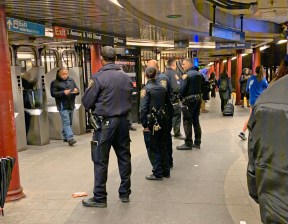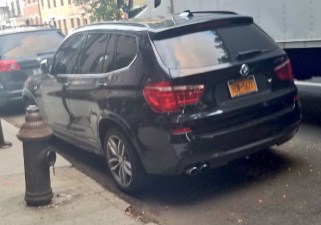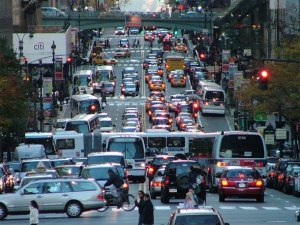De Blasio Relents On MTA’s Insatiable Demand For Cops — But It Doesn’t Have To Be This Way

Mayor de Blasio caved to the demands from the state-controlled MTA to send even more cops into the subway system — a decision that underscored how easily this mayor is cowed, but also paves the way for a new approach by whoever is sworn in at City Hall in 228 days.
On Monday morning, the mayor announced that he was directing the NYPD to assign another 250 police officers into the subways, on top of the 500 that were sent there earlier this year in a “surge.” There are now 3,250 NYPD cops in the system, almost as many as there were in the 1990s, when there were 2,000 murders a year.
“We’re going to send a very powerful message that we’re putting in the resources every day, whatever it takes, get the job done,” de Blasio told reporters during his morning briefing, which came on the same day that the subway system reopened for 24/7 service.
This is the right direction – and one I’ve been calling for since February. Our recovery begins with people feeling safe to ride the subways and walk our streets. https://t.co/pWJwaVw1Tk
— Andrew Yang????? (@AndrewYang) May 17, 2021
This marked a considerable turnaround from less than a month ago, when the NYPD itself accused the transit agency of “fearmongering” because data from the department did not show a spike in subway crime. According to the most recent stats, all transit crime is down by 43 percent so far this year compared to the same period in 2020.
Yet the MTA and Gov. Cuomo, who controls the MTA, have hammered the notion that the subway system is not safe, pointing to ridership surveys that reflect a fear of crime, and high-profile (i.e. well-covered) attacks that, they say, reinforce the message.
Sarah Feinberg, New York City Transit’s interim president, told reporters at a separate press conference that the police reassignments should be permanent, and gleefully threw the mayor’s backsliding back in his face.
“A few weeks ago, we kept hearing from the city that crime in the system is at an all-time low, then that there was no problem the MTA was just ‘fearmongering.’ Then it shifted to, ‘I’m not denying subway crime is a challenge it’s just not our only challenge.’ Then: the tide will turn and the NYPD will do it,” Feinberg said. “Finally, the mayor said today, importantly that he would ‘do whatever it takes.’ Doing whatever it takes, as long as that remains the case, is great news for our riders, for our workforce, and New York.”
The transit agency also said that by June, it will have hired 400 of the 500 new MTA police officers that were budgeted (at great expense) in late 2019. Originally, those officers were meant to “mainly to support fare evasion and homelessness outreach mitigation efforts,” according to the MTA’s budget proposal at the time. But MTA CEO and Chairman Pat Foye said that those priorities have changed.
“We’re not focused primarily on fare evasion now,” Foye explained, stating that the general idea is to increase police presence to deter overall crime. “What we want to see in the NYPD and the MTA police when they’re in the subways, on subway cars and subway platforms.”
Summonses and arrests for fare evasion have drastically decreased over the last several years, but the racial disparities in the arrests and summonses have not. According to the most recent NYPD data from the first quarter of 2021, Blacks and Latinos represented 92 percent of the 209 people arrested for fare evasion, and 75 percent of those summonsed for it. Attorney General Letitia James’s 16-month investigation of subway policing is ongoing, a spokesperson told Streetsblog.
Presented with this data, Foye said that the MTA’s policy was to “redirect” fare beaters to the turnstiles, not issue a summons or arrest.
When asked why he thought de Blasio changed his mind, Foye replied, “I think it was the righteousness of our cause.”
(All this backhanded praise was for naught. Upon learning that the 250 officers would be spending just “four to five hours” on the subway, not their entire shifts, MTA spokesperson Abbey Collins said de Blasio’s decision was “irresponsible,” and that “the mayor should immediately clarify for the public and our employees once and for all the real number of officers being dedicated to the safety of the subway system.”)
The mayor’s press secretary, Bill Neidhardt, called the racial disparities in fare evasion enforcement “unacceptable.”
“It should also be noted that the city is engaged in non-police homeless outreach and engagement on the subways as well. Unlike the governor, the mayor does not believe that over-policing is the solution,” Neidhardt told Streetsblog.
David Jones, the president and CEO of the Community Service Society, who is also one of Mayor de Blasio’s four MTA board appointees, called the fight between the city and the state “unnecessary.”
“Obviously the NYPD has been working very closely with the MTA. Sarah says that, but then to go all tabloid and accuse the NYPD or the mayor of being unconcerned about the issue when clearly they’ve been pumping more resources consistently,” Jones told Streetsblog. “It’s just an overkill reaction.”
Jones said that the problems that plague the transit system, from train delays to deferred bus routes to homelessness to racially biased policing, will “require a lot more engagement by the new mayor.”
“There hasn’t been the kind of intense focus by the current mayor on the MTA, and we’re kind of kicked back on our heels because we have such a limited engagement. The mayor, because they’re pumping in billions, literally, in capital and expenses to the MTA, has a right to demand a bigger share of the administration and supervision of the transit system.”
Jones added, “It can’t be this, ‘Oh it’s the governor’s thing, we can’t do anything.'”
BREAKING:
New @PIX11News/@EmersonPolling polling shows @ericadamsfornyc leading, @scottmstringer & @KGforNYC surging in the Mayoral Primary. @AndrewYang remains near the top.Adams: 17.5%
Yang: 15.4%
Stringer: 15.1%
Garcia: 7.8%
***22.7% UndecidedMORE: https://t.co/lyC1ip2hao pic.twitter.com/n0EZ78ZdXx
— Henry Rosoff (@HenryRosoff) May 17, 2021
To that end, mayoral frontrunner Andrew Yang has argued that the city should somehow wrest the MTA from the governor’s clutches, though as Streetsblog has reported, his plan to accomplish this is neither realistic nor likely to be successful.
Yang, as well as Eric Adams, Shaun Donovan, Kathryn Garcia, and Ray McGuire, all indicated in last week’s mayoral debate that they supported more police in the subways (a fact that the MTA cited in a dubious press release).
On Monday, Yang praised the mayor’s decision on Twitter, while Adams — a former cop — reiterated his call for more police. Adams will also hold a press conference on Tuesday “to call for more effective deployment of NYPD on trains and platforms.”
With the return of 24/7 service, we must ensure that riders & transit workers feel safe in our stations.
I often say that public safety is a prerequisite to prosperity, & this is a perfect example — we won't see increased ridership w/o improved safety.https://t.co/P5CJtmVNkW
— Eric Adams (@ericadamsfornyc) May 17, 2021
Dianne Morales, Maya Wiley, and Scott Stringer all opposed adding more cops in the subway system last week. None of the eight major Democratic candidates for mayor responded to Streetsblog’s questions on Monday.
This is not the answer. Police cannot solve violence — only funding our communities can do that. This is why we need a Community First Responders Department. https://t.co/ZIiOLbvld6 https://t.co/vSLYmKEee7
— Dianne Morales (@Dianne4NYC) May 17, 2021
Stringer, talking about his transportation plan in Union Square on Monday, acknowledged that the mayor only gets four seats on the MTA board, but insisted that what is more important is “what you do with those board seats.”
“I will aggressively fight for a New York City transportation agenda,” Stringer told the crowd. “To go a step further, you know what the mayor really controls? The streets,” the candidate said, ticking off his promises to build 35 miles of dedicated bus lanes each year and his commitment to massively invest in bike infrastructure. “That’s why they’re gonna call me the ‘Streets Mayor.'”
A new poll showed that, for now, at least, his title is “the runner-up” (in this case, to Adams).



